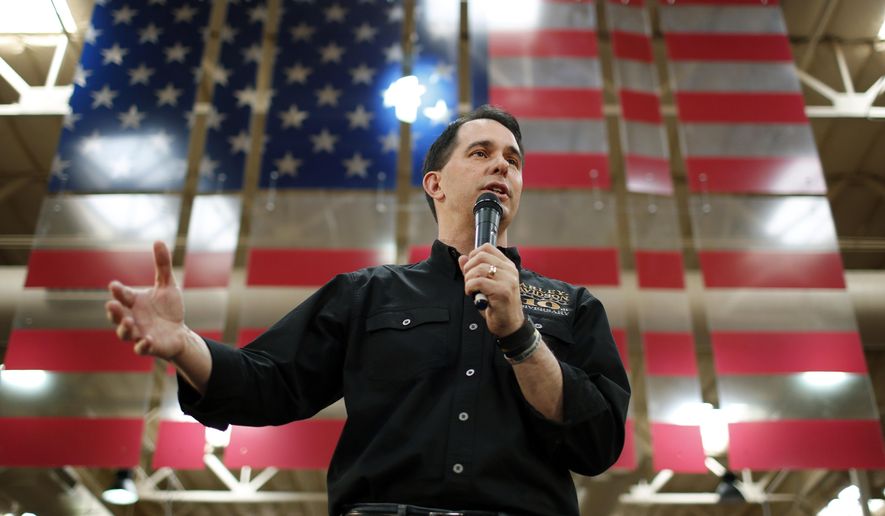The Wisconsin Supreme Court handed a big political win Thursday to Republican Gov. Scott Walker, nixing a long-running investigation into alleged illegal coordination between Mr. Walker’s 2012 recall campaign and conservative advocacy groups.
After the ruling, Mr. Walker’s presidential campaign, which launched this week, said it was time to move on from the allegations.
But critics warned the ruling portends broader consequences for campaign finance rules, and raised concerns about the impartiality of the court’s conservative majority.
In its 4-2 decision, the state high court said Wisconsin law was “unconstitutionally overbroad and vague” in defining what sort of political coordination is banned, and the judges shut down the investigation by special prosecutor Francis Schmitz.
“Today’s ruling confirmed no laws were broken, a ruling that was previously stated by both a state and federal judge,” said Walker spokeswoman AshLee Strong. “It is time to move past this unwarranted investigation that has cost taxpayers hundreds of thousands of dollars.”
Mr. Walker, who announced his 2016 presidential candidacy on Monday, was first elected in 2010 before surviving the recall effort in 2012 and won re-election in 2014. Prosecutors had alleged that Mr. Walker’s election committee coordinated with groups such as the Wisconsin Club for Growth on issue advocacy — communications that don’t expressly call for a candidate to be elected or defeated — and said the groups should have reported their spending and abided by fundraising limits.
SEE ALSO: Jeb Bush trounces 2016 Republican rivals in fundraising as Rand Paul lags far behind
But the court majority rejected Mr. Schmitz’s inquiry, saying it would open the door to armed investigators breaking down doors to investigate political speech.
“To be clear, this conclusion ends the John Doe investigation because the special prosecutor’s legal theory is unsupported in either reason or law,” the court said. “Consequently, the investigation is closed.”
Mr. Schmitz said in an email to The Associated Press that he was disappointed with the ruling and that “the decision represents a loss for all the citizens of Wisconsin.”
The ruling and subsequent reactions also appeared to be grist for both sides in the ongoing debate over the limits of free speech in campaign finance — a debate that has ramped up in the wake of the U.S. Supreme Court’s 2010 Citizens United ruling.
Justice Shirley Abrahamson, one of two liberals who dissented, accused the majority of a faulty interpretation of state law.
“The majority opinion delivers a significant blow to Wisconsin’s campaign finance law and to its paramount objectives of ’stimulating vigorous campaigns on a fair and equal basis’ and providing for ’a better informed electorate,’” Judge Abrahamson wrote.
SEE ALSO: Scott Walker to Hillary Clinton, Dems: Reject the Iran nuclear agreement
Advocacy groups that favor strict campaign finance limits said the kind of coordination that now is allowed in Wisconsin effectively kills contribution limits.
“By limiting the reach of Wisconsin coordination rules to ’express advocacy,’ for or against candidates, the court has made campaign finance law extraordinarily easy to evade,” said Daniel Weiner, senior counsel at the Brennan Center for Justice. “No other court has gone this far and for good reason — it is a misreading of the law and threatens fair and transparent elections.”
Tara Malloy of the Campaign Legal Center called the ruling “an outrageous act of judicial activism” and said at least two of the justices who joined the majority should have recused themselves from the case because of the support they received from some of the groups under investigation.
But Todd Graves, a former U.S. attorney who served as counsel for the Wisconsin Club for Growth, and Eric O’Keefe, who had to defend themselves in the case, said the government “used their unlawful investigation to try to threaten and embarrass groups they do not like, specifically because of the groups’ constitutionally protected efforts on libertarian and conservative issues.”
“The government acted as if key protections in our nation’s Bill of Rights simply did not apply,” Mr. Graves said.
⦁ This article is based in part on wire service reports.
• David Sherfinski can be reached at dsherfinski@washingtontimes.com.




Please read our comment policy before commenting.